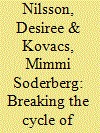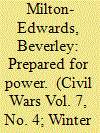| Srl | Item |
| 1 |
ID:
072542


|
|
|
|
|
| Publication |
2005.
|
| Summary/Abstract |
This article analyses the prospects for sustainable peace in Liberia. The implementation of the 2003 peace agreement has largely been successful, but there are reasons for concern. Liberia's history of repeated cycles of violence and fragile peace provides valuable lessons for the current peace process. The article argues that Liberia's future is contingent on three critical aspects. First, the management of the immediate and long-term security challenges in terms of the reconstruction of the security forces, the reintegration of ex-combatants and the management of spoilers. Second, the capacity and willingness of the new government to promote democratic progress and good governance. Third, the political developments in the neighbouring region.
|
|
|
|
|
|
|
|
|
|
|
|
|
|
|
|
| 2 |
ID:
072541


|
|
|
|
|
| Publication |
2005.
|
| Summary/Abstract |
This article compares the attitudes and actions of the American political and intelligence communities towards Irish republicanism since the start of the 'Troubles' and Islamic fundamentalism in Afghanistan before 9/11. It argues that while romantic notions of both groups' struggles existed in political circles, the intelligence agencies have always retained a strong counter-terrorist strategy, especially after IRA violence escalated in the 1970s and as Islamic fighters turned their jihad against the US after the end of the Soviet occupation of Afghanistan. A constructivist analysis is offered as the explanation for positive American political engagement in the Northern Ireland peace process in the post-Cold War era and for the rapid degeneration of relations with Islamist groups. Consequentially, the article demonstrates how external influences come to bear on internal conflicts.
|
|
|
|
|
|
|
|
|
|
|
|
|
|
|
|
| 3 |
ID:
072539


|
|
|
|
|
| Publication |
2005.
|
| Summary/Abstract |
This essay examines why paramilitary forces have become increasingly critical to Haitian politics over the past half century as an attempted solution to political instability during the previous 150 years since the 1804 independence. The repeated interruptions at democratization in the past two decades have accelerated instability and reliance on paramilitary forces. The strategy worked during much of the Duvalier dictatorship (1957-86) by institutionalizing the state paramilitary, which became known as the Tons Tons Macoutes. The abolition of the Macoutes after the end of Duvalierism in 1986 did not halt the reliance on paramilitary coercion by the state. As paramilitary forces were used by the opposition, as well as the state, paramilitaries escalated insecurity and human rights violations by all sides. Particularly during his second presidential term, Jean Bertrand Aristide (2001-04) feared another coup and exile such as occurred during his first term (1991-94). His paramilitary came from urban gangs, which led to increases in arms wielded by proliferating, corrupt forces on all sides. The second major UN peacekeeping mission (2004-present) provided relative stability during the 2006 elections but, along with the interim government (2004-06), failed to disarm the urban gangs and rural armed groups.
|
|
|
|
|
|
|
|
|
|
|
|
|
|
|
|
| 4 |
ID:
072538


|
|
|
|
|
| Publication |
2005.
|
| Summary/Abstract |
This article examines the development of Hamas and its prospects for power in the wake of electoral successes, changes within the broader movement of Palestinian nationalism and the Israeli disengagement from the Gaza Strip. The challenges that now beset Hamas are discussed in tandem with a reflection of demands related to governance, democracy, security and reform that affect many societies emerging from conflict. The major contention lies with the question of systems of transitional governance and whether they can withstand growing internal fragmentation and necessary demands for power sharing.
|
|
|
|
|
|
|
|
|
|
|
|
|
|
|
|
| 5 |
ID:
072540


|
|
|
|
|
| Publication |
2005.
|
| Summary/Abstract |
Funding for assistance in areas of violent conflict is variable, and access for aid organisations is sometimes limited. Faced with financial and logistical constraints, donors and NGOs appeal to their moral perspective to justify their approach. Is this strategic, and what does it achieve? Drawing on research into the UK's Department for International Development (DFID) and the work of NGOs in southern Sudan, this article argues that the language employed - whilst apparently intended to be persuasive - can be counterproductive: it can create an unwarranted sense of moral ease on the part of aid staff, and it can provoke uncooperative behaviour in the people towards whom it is directed.
|
|
|
|
|
|
|
|
|
|
|
|
|
|
|
|